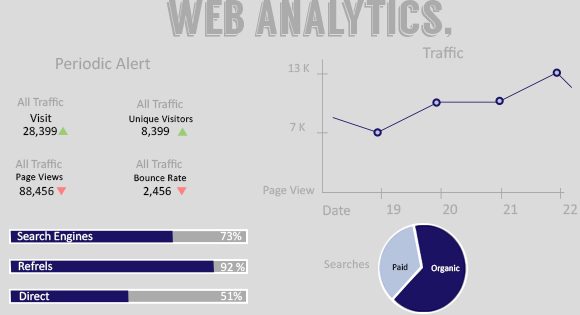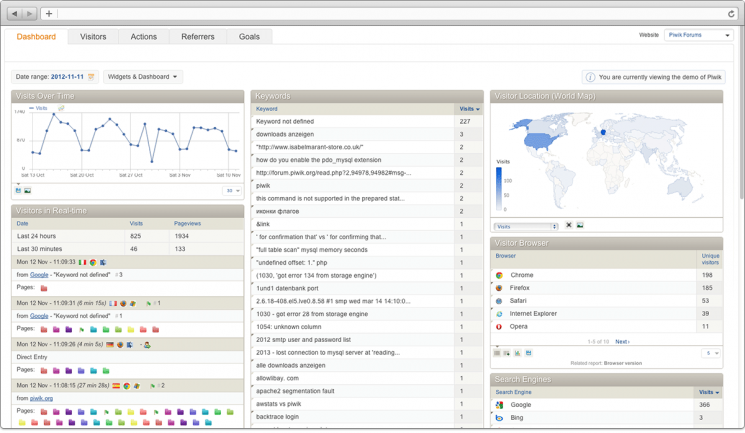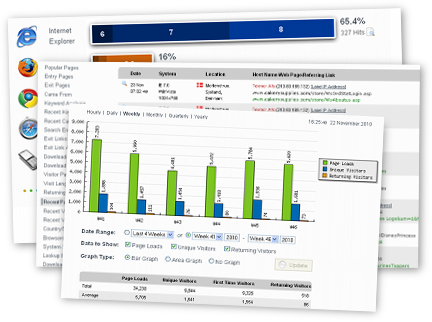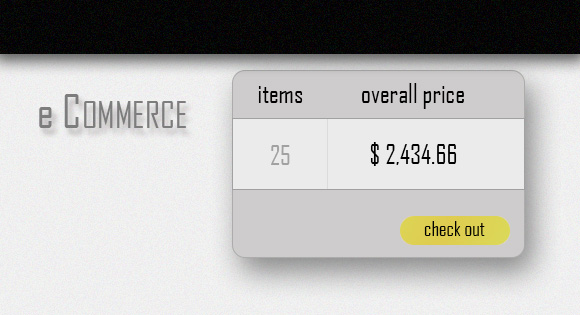http://www.myshopping.com.au/PT–84_Software_web_design_software__fs_29964_e__
Why Do I Need Analytics
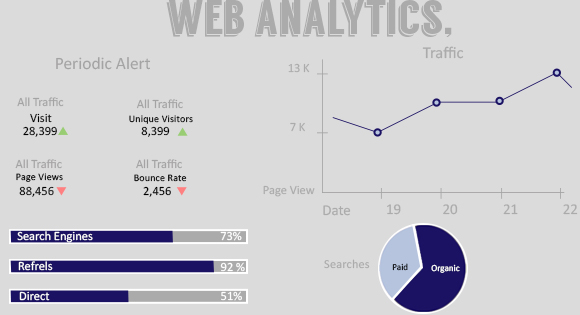
Analytics is as important as having business objective, whatever is the purpose of the website you need analytics. This is the only way to measure your success or failure, as there is no meaning in having an objectives unless we can achieve it, by progressively tracking the progress of the objectives and check whether they are fulfilling the tasks they are intended to do so and take necessary actions as and when required.
In web analytics the basic principle of Analytics is to record/ track the users & their moment on the website, which each and every analytics tool performs quite brilliantly they must, to make sense and get the name analytic tool. These data’s are used by 99% of website owners and admins only to the number count of visitors and the pages they surfed for, web analytics are not only meant for this it’s all about measuring the progress of your objective, most of us are not examining what those data’s can really tell about your objective completion status, not only the audience count.
There isn’t anything new or much to learn, or to be an expert; even the basic principles of analytics remain the same (Record User Moments/Action) all that is to be done is effective utilization of data, since you are in the era of digital systems it not even brings any calculation’s to your side, your role still remains the same “Read the provided Data”. To be an expert all you need is to have an idea of what you are looking for when you are analyzing.
We will get across the effective usage techniques of the analytical system data and of course few analytics tools as well as well.
How can web analytic track your objective?
For a website to be successful with its campaign it has to satisfy the expectations of its target visitors about your product. In order to measure the progress of the campaign and take necessary actions you need to be aware of the number of visits, most visited pages, count of visitors that gets converted into customers, the sources of entry, age group and more, with this information in hand you can easily get a glance at the effectiveness of the campaign and decide on future course of action.
Web analytics can do all these for you. A bundle of free and premium tools makes these tasks a piece of cake. In order to get results at such high precision, you may need to fine tune web analytics tool.
What Can You Track
It’s fair to inform you at the beginning that all objectives are not traceable, in fact they are traceable but quite hard, and more than 80% of your objectives can be tracked, so it’s really worth that you spend some time in this. Elements that are recorded at ease are Sales, Newsletter Subscribers, and Announcements.
50% of the tracking problem comes in when the website is not the only medium that you used to sell your product, only because you don’t know from where your customer just came from. It can be after getting the information from your website or any other source.
But it’s also possible to trace the source with a little more effort; you can give the customers promo codes for reduction in purchase. Employing different promo codes for the different medium you use to advertise can easily get you to the source of the customer.

You can provide deals and discounts in your advertisements and ask customers to mention them, it brings in customer & source as well.
But there are a few drawbacks as more than 50% of the customers forget to inform about this or forget the code when they come to shop.
Similarly having a spate email address & telephone for non-customers and different contact info in customer section enables you to recognize the incoming traffic. You can even greet the calls differently; this will increase the support credibility of your company as well.
What Make it Important
Although we discussed about the need for analytics in the beginning, I would like to inform 3 more key ideas related to business websites which increases the level of importance you have to give before we go into some tools, these points may or may not be valid for other websites like personal, NGO, etc.
- Understand your standing in the market, which gives you the control to act accordingly.
- Understand your potential customers by age group, geographical location the peak time, with these you can narrow your monetizing methods based on the target. It can bring in more customers and reduce the cost you spent earlier without knowing the target audience.
- Get precise count of your income to the investment you made for and take necessary actions based on the result. This is important for business to avoid loss, if the methods aren’t working as you wanted it to.
The Tools
In this section there is no shortage of tools, number of analytics tools in the market are countless, as it can be built by any developer for their use or as an open project. Taking that into consideration I will be able to review only a few and I am interested only to review only the free ones.(I haven’t used any premium one to review them 😉 )
The main problem with the analytic tools is not with them actually, it’s with the one who uses it, most of the time we question the functionality of it rather than using the data it provides. A single tool may not be able to provide you with all the data you need in that case you may have to use multiple tools, that is quite common to use more than one analytics.
Make sure you don’t go above 3, or even 3 unless it’s a must, using analytics will definitely slow down your website, though it’s one element where you must compromise your performance.
There are plenty of free and premium tools for analytics, it is entirely up for you to decide which one to choose from, those services can be expensive.
Google Analytics
This piece analytics tools from the internet giant is a man made marvel in every way you can look at. It can do most of the things from visitor counting to advanced analytics suites at high precision, except Google does it for free.
Google Analytics analytics allow specific campaigns, goals, funnels, and reports that can inform you about the result of a new campaign to complete site redesign like whether you should make any changes in the first place or not.
There are quite a few reasons that make a lot of web developers recommend Google Analytics.
- It’s Free.
- Easy to use.
- Highly Accurate.
- As the maintenance & development is by Google you don’t have to worry about upgrades and setups.
- Support for Mobile Platforms.
Piwik
Piwik is an Open Source Web Analytics Platform, its the best self hostable Analytics tool you can ever get, it looks & feels similar to Google Analytics in almost all aspects. The key advantage or is a drawback for many is that you have to host it on your own server.
Piwik reports on how visitors come to your website (e.g. via search engine, a marketing campaign, a click through from another website, social media, etc.), what they do on your website (pages viewed, frequency of visits, depth of visit), how they convert (e-commerce and other goals) and general visitors information (engagement, location, settings used, returning visitors, and more).
Fire Stats
Fire Stats is also an Open Source Web Analytics Platform written on PHP and MySQL, its also needs self hosting. Unlike the above two it also allows PHP tracking code.
Stat Counter
Stat Counter is a freemium version of analytic service, you can create accounts and use it for free but the storage of statistical data limits applies for free accounts.
Just A Minute
Before we wrap up let looks once more on the major benefits of performing analytics is that you get to know the behavioural pattern of your target customers, identify trending hours of the day when business reaches peak, and what your potential customers look for in your website then perform the necessary action to improve. How small or big you are analysing the trends is important.
Implementing Analytics will definitely have an effect on the website’s performance for sure, but it’s worth compromising. To minimise the effect here are some recommendations:
- Always minimise use of multiple Analytics tools. (Max: 2 or 3)
- Try to go for the most used one like Google Analytics, as the javascripts for the analytics will be cached in most client browsers.
- Always Load the Javascript for the Analytic tool at the end of the page.
These will certainly help you reduce the performance effect. With all this done lets hope for the best.
Happy Analysing 🙂

